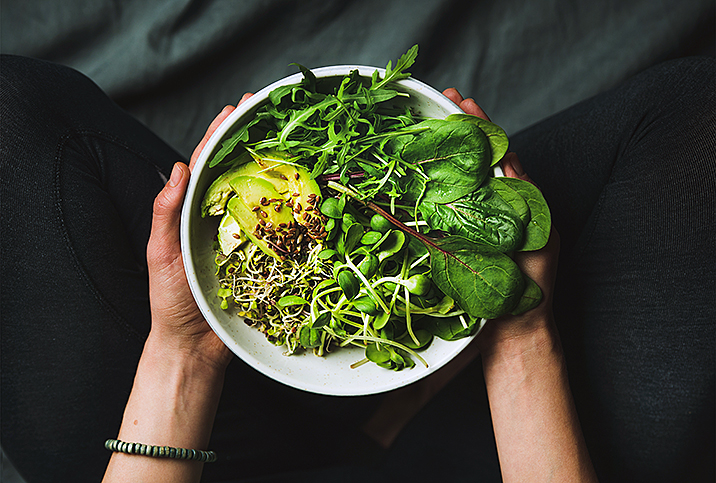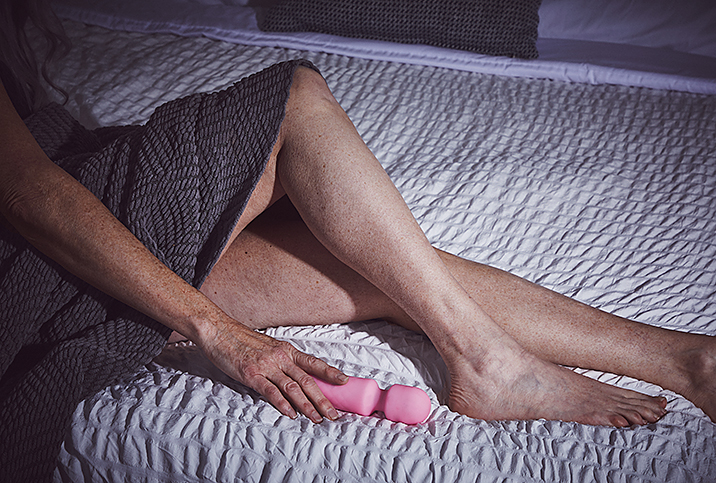Do These 7 Natural Menopause Treatments Really Work?

Key Points
- Symptoms of menopause vary in type and severity, and can substantially affect women's quality of life and ability to work and function day-to-day.
- Hormone replacement therapy works by replacing the hormones estrogen and progesterone that the body stops producing during menopause.
- No treatment is one-size-fits-all. A holistic approach involving medical intervention and lifestyle adjustments is often best.
Menopause can have profound adverse effects on a woman's overall health and well-being. Hormone replacement therapy (HRT) can help. But it might be helpful to integrate lifestyle adjustments, too.
Here are some methods of menopause self-care to consider trying.
What causes menopause symptoms?
Hormone fluctuations cause menopause symptoms. These symptoms can include:
- Hot flashes
- Night sweats
- Vaginal dryness
- Mood swings
- Irritability
- Constipation
The steep drop in estrogen is responsible for most issues, since the hormone is involved in various body functions, from reproduction to cognition and body temperature regulation.
Symptoms vary in type and severity from person to person. They can substantially affect women's quality of life and ability to work, according to a 2013 study.
Why would you want to try managing menopause without HRT?
Hormone replacement therapy works by replacing the hormones estrogen and progesterone that the body stops producing during menopause.
There are benefits of HRT, and for many, it is a safe and effective treatment for moderate to severe symptoms such as hot flashes, night sweats, vaginal dryness and painful sex. HRT can also help to preserve bone health and prevent postmenopausal osteoporosis.
Celebrities, such as Naomi Watts, Jane Seymour, and Michelle Obama have all used HRT and praised its healthful effects.
An earlier 2002 study indicated an association between HRT and an increased risk of blood clots, breast cancer and stroke, however, the study has since been deemed erroneous. New research indicates otherwise.
Breast cancer risk is reduced in women who have estrogen-only HRT, indicated a 2013 report. Other studies since suggest a reduction in osteoporosis-related fractures, protective effects for coronary disease, and a reduction in mortality rates and colon cancer. Rates for venous thrombosis and ischemic stroke were rare in younger women.
HRT isn't for women who have previously had certain cancers. The menopausal treatment can carry some risks, including:
- Increased risk of blood clots in women who begin HRT over the age of 60 or 10 years past menopause onset
- Minimal risk of breast cancer, less than one additional case of breast cancer per 1,000 women per year of MHT use with and three additional cases occur per 1,000 women when MHT is used for five years
- Increased risk of uterine cancer (in women who still have a uterus and take estrogen-only therapy instead of a combined estrogen-progesterone treatment)
However, the result of studies since the flawed 2002 HRT study indicate a beneficial risk-to-benefit ratio, suggested the 2013 report.
"Generally, women with a history of hormonally sensitive cancers, coronary disease, history of a heart attack and/or a history of developing a stroke should not use HRT because it can increase the risk of recurrence and additional medical complications," said Janet Choi, M.D., chief medical officer of Progyny, a fertility and family building benefits management company based in New York City.
"Even those who find relief with hormone replacement therapy should take additional measures to preserve their health," said Meleen Chuang, M.D., clinical associate professor, Department of Obstetrics and Gynecology, Family Health Centers at NYU Langone in New York City.
"I typically encourage individuals undergoing HRT to exercise regularly and eat healthy, along with adding calcium, Vitamin D and weight-bearing exercise to their routines to maintain bone health and mitigate menopause-related health risks," she added.
1. How can you prevent hot flashes naturally?
"Lifestyle and behavioral changes are generally the best ways to manage hot flashes," said Alyssa Dweck, M.D., chief medical officer at Bonafide Health, who practices in Westchester County, New York.
"These include wearing breathable fabrics, dressing in layers and avoiding individual triggers, such as alcohol, caffeine, smoking, excess sugar and spicy foods. Exercising regularly and reducing stress are equally important," Dweck said.
Stress relief
Cognitive behavioral therapy (CBT), clinical hypnosis, meditation, breathing exercises and word repetition are valid ways to manage hot flashes, according to the North American Menopause Society (NAMS).
These activities may help by reducing stress and anxiety, which are known to trigger and exacerbate vasomotor symptoms.
According to NAMS and a 2011 study published in Menopause, breathing exercises and meditation can reduce hot flash frequency. Additionally, you can use some of these techniques to work through hot flashes in the moment, which may make them less distressing.
Exercise
Exercise, including cardio and weightlifting, has proven effective for some people. Women who participated in a 16-week exercise program had fewer hot flashes than women who didn't, indicated a 2016 study.
Women who did strength training three times a week for 15 weeks experienced nearly a 50 percent reduction in hot flashes, suggested a 2019 study.
Researchers believe exercise improves the body's temperature control, helping it react better to sudden changes. It can also alleviate stress. Yoga reduces your stress response, causing a dip in cortisol levels.
Recommended
- Between the Pages: 'Menopause Companion' Offers Evidence-Based Advice: Author Sasha Davies provides a roadmap for navigating perimenopause through postmenopause.
- Talking About Potentially Painful Sex With a Menopausal Partner: Here's how to navigate this uncomfortable yet necessary conversation about sex during menopause.
- The Most Common Sex Issues, Explained: Two therapists discuss the most frequent sex problems to cross their couches.
2. What are the best natural remedies for night sweats?
As with hot flashes, adopting healthy habits is the best way to prevent night sweats naturally, Dweck said.
Along with exercise and stress-relieving practices, these methods may include:
- Keeping the bedroom cool
- Using a bedside fan
- Taking a cool shower before bed
- Dressing in breathable, moisture-wicking fabrics
- Using light blankets
- Avoiding triggers, such as alcohol or spicy foods, before bed
Some research suggests phytoestrogens and black cohosh could also be beneficial.
Phytoestrogens
"Phytoestrogens, a natural plant compound, can mimic how estrogen behaves in the body," Choi said.
"Since their chemical structure is very similar to that of estrogen, the body's estrogen receptors actually treat phytoestrogens as though they are the estrogen hormone. Foods such as soy, linseeds and flaxseeds are rich in isoflavones, a common type of phytoestrogen," Choi finished.
Women who ate a low-fat vegan diet high in soy products for 12 weeks experienced a 95 percent reduction in total hot flashes, a 100 percent decrease in severe hot flashes and a 96 percent reduction in moderate-to-severe episodes, suggested a July 2021 study published in Complementary Therapies in Medicine.
Adding a half cup of soybeans to a low-fat vegan diet for 12 weeks decreased women's hot flashes by 79 percent, indicated a 2021 study published in Menopause. The women also stopped having moderate or severe episodes.
However, research on phytoestrogens for menopause relief has produced mixed results.
As of yet, there is no conclusive evidence that phytoestrogens helped to reduce night sweats or hot flashes frequency or severity, suggested a 2013 report. Some researchers posit the positive effects may instead be attributable to other factors, such as weight loss associated with a plant-forward diet.
"Phytoestrogens could be harmful to some people if consumed incorrectly," Choi said. "For example, NAMS advises people with a history of breast cancer to avoid isoflavone-rich foods and supplements."
Black cohosh
"Although research has produced mixed results, some studies indicate black cohosh may also be effective in reducing hot flashes and night sweats," Chuang said.
Scientists previously thought black cohosh worked by mimicking estrogen, but recent research indicates that's not the case, according to the American Menopause Society (AMS). It may affect serotonin activity, indicated a 2008 report.
Black cohosh is generally considered safe, but the AMS reports that it has been linked to liver problems in rare cases. Talk to your doctor before trying black cohosh or other supplement.
3. What are the best supplements for menopause brain fog?
The term "brain fog" encompasses several cognitive challenges, including trouble concentrating, difficulty finding the right words, forgetfulness and a general fuzzy-headed feeling.
It's estimated that 60 percent of people experience brain fog at some point in the perimenopausal or menopausal period, indicated a 2013 report.
Many potential contributors to menopausal brain fog, in addition to changing hormones, can include the brain's biological aging, lack of quality sleep and midlife stresses, such as taking care of aging parents.
Besides hormone replacement therapy, exercise and stress reduction, research suggests a diet rich in nutrients—such as vitamin D and omega-3 fatty acids—may help.
Vitamin D
Also called the "sunshine vitamin," vitamin D is a fat-soluble nutrient crucial for immunity, bone health and brain function.
Low vitamin D levels are associated with cognitive decline and brain fog symptoms. Vitamin D deficiency is also linked to depression and depressive symptoms, which can impede thinking and concentration, suggested a 2019 report.
Taking vitamin D supplements or getting more vitamin D through sunshine and diet may improve depressive symptoms, including brain fog, and improve overall mental health and cognitive function, indicated a 2021 study, a 2020 meta analysis, and a 2014 report.
Dietary sources of vitamin D include:
- Egg yolks
- Dairy products
- Oats, mushrooms
- Fatty fish
- Fortified foods, such as almond milk
The body also produces vitamin D after absorbing the sun's ultraviolet rays. However, exposing skin to the sun without applying sunscreen for more than a few minutes daily can raise the risk of skin cancer.
Most adult women need at least 600 IU of vitamin D, according to the National Institutes of Health (NIH) 2024 update, though doses of 1,000 IU are considered safe. Your healthcare provider may recommend a supplement if you can't get enough vitamin D through sunlight and diet.
Omega 3s
Omega-3 fatty acids are healthy fats found in foods such as nuts, seeds and fatty fish. They may help alleviate anxiety, depression and cognitive difficulties in menopausal women, indicated a 2022 report.
"Omega-3 fatty acids may promote mental health and cognitive function by enhancing serotonin levels, boosting brain-derived neurotrophic factor (BDNF) in the hippocampus, fostering nerve cell growth, regulating the body's stress response and reducing brain inflammation, thus improving brain function and mood," Costa said.
Of the 11 types of omega-3s, two of the most important are eicosatetraenoic acid (EPA) and docosahexaenoic acid (DHA).
People who were supplemented with 1.16 grams of DHA daily for six months experienced improvements in their episodic and working memory, suggested a 2013 study.
Another study on people experiencing loneliness found that folks who took 1.25 or 2.5 grams of omega-3 fatty acids daily for four months had better memory than those who didn't, according to the 2014 report.
Omega-3s may also help improve depressive (2019 report) and anxiety symptoms (2018 review), according to research.
4. What's the best way to manage fatigue and mood changes?
Around 40 percent of people experience mood swings similar to premenstrual syndrome (PMS) during menopause, according to the American College of Obstetricians and Gynecologists ACOG 2023 report.
Additionally, roughly 42 percent of perimenopausal and postmenopausal women have depression, according to a 2019 study published in the Journal of Mid-Life Health.
Anxiety and fatigue are common.
There is no one right answer to combat menopausal fatigue and mood swings. However, research suggests various medical treatments—including talk therapy, CBT and medications—may be beneficial.
Lifestyle changes, such as exercising, eating a healthy diet and prioritizing sleep, may also help, as can omega-3s and vitamin D.
Diet
Diet and sexual health are inextricably linked. Research suggests that throughout a person's life, eating plans high in ultra-processed foods and sugar can contribute to or exacerbate a range of issues, ranging from fertility difficulties to depression and heart disease.
"The blood sugar spikes and crashes that commonly occur with these diet types can also worsen fatigue, mood swings and irritability associated with menopause," said Kelsey Costa, MS, RDN, a registered dietician and advisor for Consumer Health Digest, who is based in the Greater Boston area.
Conversely, diets like the Mediterranean diet—which emphasizes plants, lean proteins and healthy fats—have been linked to better mental and overall health.
"A diet rich in vegetables, fruits, lean proteins and whole grains can help maintain stable blood sugar levels, support hormonal balance and provide the body with the essential nutrients it needs to manage the physical and emotional changes occurring during menopause," Costa said.
Menopausal women who ate a Mediterranean-style diet had fewer menopause symptoms—including depression, irritability and anxiety—than those who didn't, indicated a 2022 study published in Frontiers in Endocrinology.
Exercise
Regular exercise is one of the best ways to improve energy, mental health and overall well-being for all people, including those in menopause, indicated a 2024 systemic review.
Some research suggests exercise is as effective as antidepressant medications or CBT.
- Participating in a 12-week walking exercise program improved menopausal women's physical and mental health and quality of life, shared a 2020 report.
- A 2017 review published in Maturitas similarly reported that exercise improved depression symptoms in women at midlife and older, suggested a 2017 report.
Sleep
Besides making you feel tired during the day, getting too little or low-quality sleep can impede your ability to think clearly, make decisions and maintain emotional balance. Sleep changes as you age.
But, inadequate sleep is closely linked to depression, anxiety, risk-taking behavior and suicide.
Managing other symptoms, such as night sweats, may help you sleep more soundly, as can the following:
- Maintain a consistent sleep-wake schedule.
- Avoid screens, including your phone or laptop, in the hour before bed.
- Avoid heavy meals close to bedtime.
- Avoid caffeine, including soda, tea or coffee, in the afternoon.
- Keep your bedroom quiet, cool and dark.
Some research suggests that herbal supplements—such as melatonin and Valerian root—can help people fall asleep faster and improve sleep quality. Speak to your doctor to learn if these supplements are right for you.
5. How can you manage menopause and constipation naturally?
Many people experience gastrointestinal issues, such as constipation, in the years leading up to and during menopause. Fluctuating hormones are typically to blame, but constipation can also be a side effect of certain medications, such as iron supplements, some antidepressants, calcium channel blockers and incontinence medications that people are more likely to need in midlife.
Staying active, drinking plenty of water and eating a high-fiber diet with plenty of fruits and veggies can help keep your bowels moving smoothly. These lifestyle choices can also help prevent bone loss and heart disease, among other conditions that are more prevalent with age.
Supplements, such as fiber, senna and magnesium, may also be beneficial. Your doctor can help you decide what to choose based on your health and current medications.
Senna
Senna, an herb found in brand-name supplements including Ex-Lax and Senokot, contains compounds called sennosides, which help food travel more quickly through the digestive tract.
In one 28-day study, researchers gave one gram of senna daily to people with constipation and found the treatment significantly improved symptoms compared to a placebo, suggested a 2021 study.
Although it's generally considered safe, senna can be detrimental and may cause liver damage if used in high doses for long periods. Talk to your doctor before trying this or any other supplement.
Magnesium
Magnesium is essential for several bodily functions, including digestion and gut motility, and research suggests certain forms can relieve constipation.
In one small, placebo-controlled study, women with mild to moderate constipation who took 1.5 grams of magnesium oxide daily found their symptoms significantly improved, suggested a 2019 report.
Other studies have shown magnesium citrate (2020 report) and magnesium sulfate (2023 report) are also effective. The latter, however, may cause unpleasant side effects, such as bloating and diarrhea.
Taking too much magnesium can be dangerous, and is not for people with kidney disease, so talk to your doctor beforehand to see if magnesium is right for you.
6. What can help with vaginal changes during menopause?
Sex after menopause may be different, in part due to changes in the vagina and surrounding tissues. Vaginal dryness can occur at any age but is particularly common during and after menopause.
Folks ages 40 to 45 have about a 20 percent chance of experiencing vaginal dryness, while those in the postmenopausal period have roughly a 66 percent chance of developing it, according to a 2017 survey published in the Journal of Sexual Medicine.
"Over-the-counter estrogen creams and lubricants can help to alleviate vaginal dryness and atrophy—or thinning, drying and inflammation of the vaginal walls—which often co-occur," Choi said. "These creams contain estradiol, which is bioidentical to estrogen."
Some women, including breast cancer survivors, may not want to use estradiol. Coconut oil, aloe vera, jojoba oil and vitamin E oil are good alternatives.
"Coconut oil is safe for use on most skins and contains emollient properties great for vaginal lubrication," Chuang said.
Before putting coconut oil in your vagina, do a patch test on your arm and wait for a day or so to ensure you don't have an allergic reaction.
7. What are the best essential oils for menopause?
Some research supports using specific essential oils—highly concentrated plant extracts—to relieve menopause symptoms, such as sleep disturbances, fatigue and mood difficulties.
Although generally considered safe, some essential oils can be harmful if ingested. Just 12 drops of sage oil, for example, is considered toxic. They may also cause skin irritation if applied directly without dilution.
Mixing essential oils with water or carrier oils, such as olive, coconut or jojoba, and using them sparingly can reduce risks.
Some essential oils to try may include:
- Lavender. Multiple studies have shown that lavender may be effective in reducing stress and improving sleep. Some, including a 2016 report, suggest it could also help relieve hot flashes and headaches.
- Eucalyptus. Although it's usually used to treat sore throats, some research indicates eucalyptus may help to treat other forms of pain and inflammation, suggested a 2013 report. "Additionally, it may produce a cooling effect that could help with hot flashes," Dweck said.
- Peppermint. Peppermint oil is a common remedy for relieving stomach cramps, but according to a 2023 study, it may also reduce menopause symptoms.
- Clary sage. As with eucalyptus, inhaling sage fumes or applying a diluted sage solution to your feet and the back of your neck could provide a cooling sensation to alleviate hot flashes. Clary sage may also have antidepressant-like effects, suggested a 2014 study.
The bottom line
Everyone's experience with menopause is different, and no treatment is one-size-fits-all. A holistic approach involving medical intervention and lifestyle adjustments may help.
Talk to your healthcare provider to determine how to best address your unique needs.


















